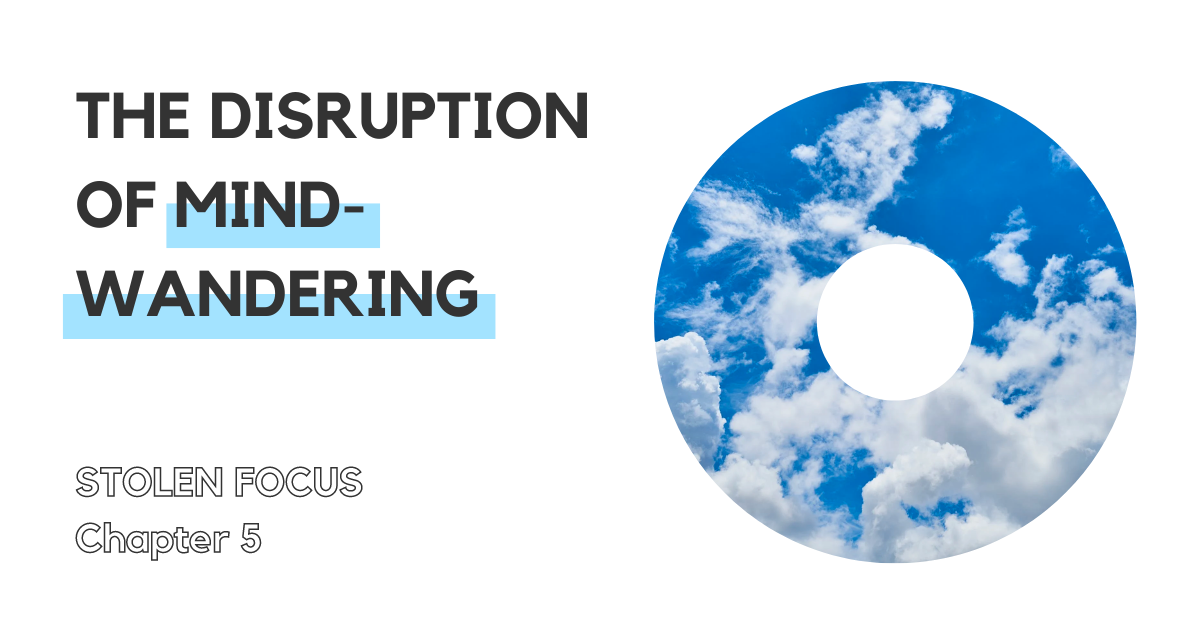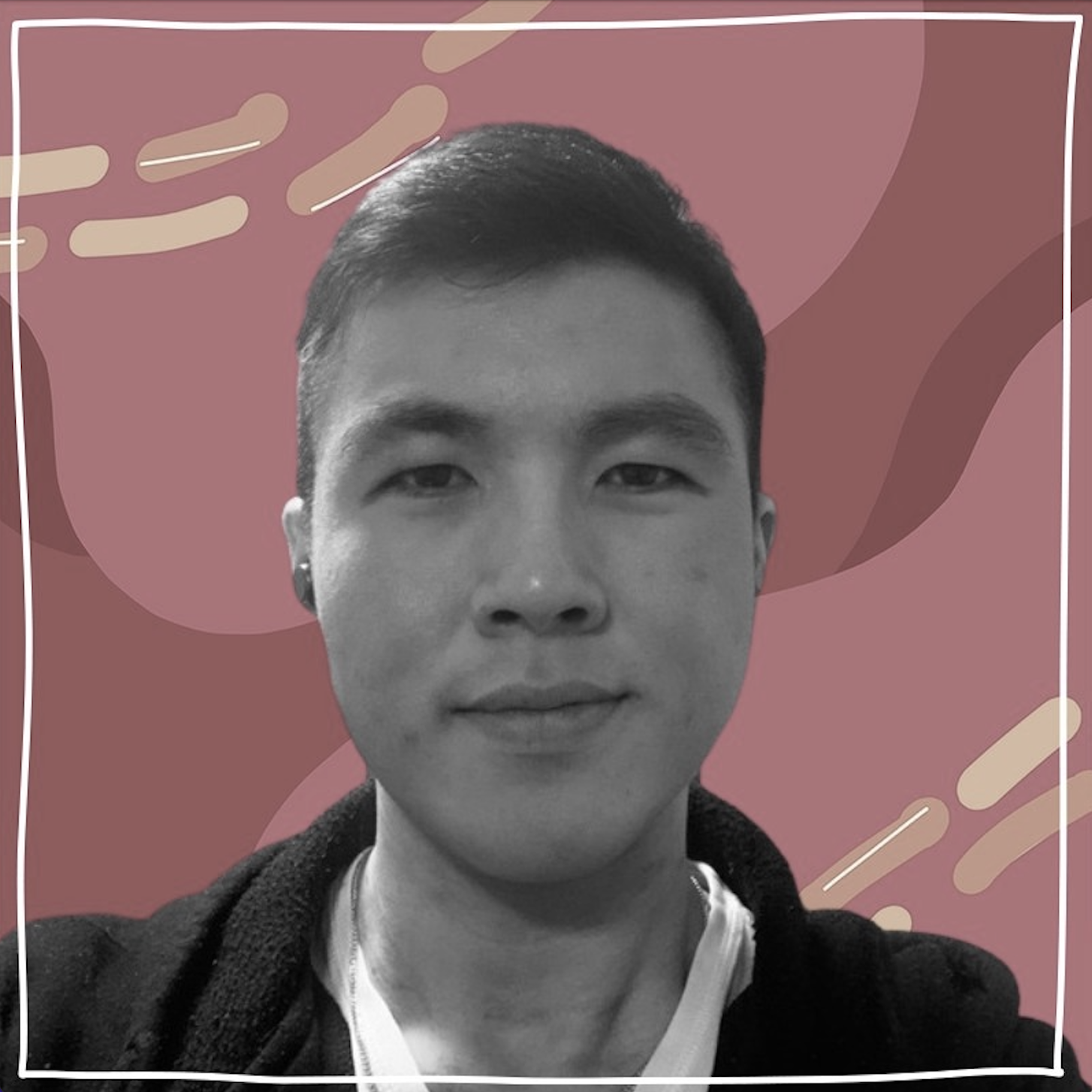‘[your attention] just shifts [to other, crucial forms of thinking]’ – Stolen Focus, Chapter 5 Notes
Posted on: June 7, 2022
Post Category: Book Notes

About #onepageonepoint
#onepageonepoint aims to summarise new ideas from books on personal and professional development – with (approximately) one point for each page. Read more about this project here.
Today for #onepageonepoint, we have summary notes for Stolen Focus – for chapter 5: ‘Cause 5: The Disruption of Mind-Wandering’.
If you are interested in getting yourself a copy or learn more about the book, click here.
Chapter 5: ‘Cause Five: The Disruption of Mind-Wandering’
- Attention is usually defined as a person’s ability to selectively attend to something in the environment – i.e. to control and narrow their “spotlight” – but there are other forms of attention, which are under greater threat than your spotlight.
- There was one day Hari didn’t see coming during his detox at Provincetown: he left his iPod at the house and his mind started to wander – extending for long periods of time, where he would let his thoughts float, remember memories of his childhood, come up with more creative ideas, etc.
- Marcus Raichle, one of the developers of the PET (positron emission tomography) scan, noticed activity from one part of the brain shifted to another and was still highly active when he had patients strapped in for a PET scan, waiting for a task to be given to them. This was significant since, from his medical knowledge at the time, he believed that a brain that wasn’t focusing was one that was ‘lying there dormant, doing nothing, like muscles do until you start to move them’.
- He studied this in detail and named the region of the brain that becomes more active (when not focussing on one thing) as ‘the default mode network’ – and currently some scientists believe this region becomes the most active during mind-wandering (while others strongly disagree).
- Based on findings by Nathan Spreng (McGill University) and Jonathan Smallwood (University of York), there are three crucial things happening during mind-wandering: (1) you are slowly making sense of the world, (2) it starts to make new connections between things, which often produces a solution to your problems, and (3) mental time travel, where it predicts the future using past experiences.
- Smallwood ‘found that the more you let your mind wander, the better you are at having organised personal goals, being creative, and making patient, long-term decisions. You will be able to do these things better if you let your mind drift, and slowly, unconsciously, make sense of your life’ (Hari 2022, p. 91).
- Spreng explains that during mind-wandering ‘it’s not like attention necessarily goes down – it just shifts [to other, crucial forms of thinking]’ (Hari 2022, p. 93).
- Spreng further explains that focussing on what’s in front of you gives you ‘some of the raw materials that has to be digested, but at some point, you need to stand back… to let the brain digest what’s been going on’ (Hari 2022, p. 93).
- Spreng nods when Hari asks about digital distractions: ‘All this frenetic digital interruption is pulling our attention away from our thoughts and suppressing your default mode network… I think we’re almost In this constant stimulus-driven stimulus-bound environment, moving from one distraction to the next’ (Hari 2022, p. 94).
- From a 2010 experiment by Harvard scientists (Professor Dan Gilbert and Dr Matthew Killingsworth), people were given a prompt on an app whenever they did different activities, and the prompt asked them to type in what they were doing and rank how they felt. Surprisingly, it was found that people were less happy when people were mind-wandering, compared to almost any other everyday task – so ‘a wandering mind was an unhappy mind’ was the conclusion.
- Hari explains that this result, from the Harvard study, may be because wandering can lead to rumination or accumulating stressful thoughts: “In situations of low stress, mind-wandering is a gift. In situations of high stress, mind-wandering is torment” (Hari 2022, p. 96).
- After going to a computer in the Provincetown library and peeking through his email and twitter, Hari found that there weren’t many updates to his inbox or following after notifying people he would be uncontactable, to which he realised that the demands on his time from social media was because of a need to feel important.
- After leaving Provincetown in August, his precommitment strategies in preparation for going back to normal life (which involved using Freedom and a kSafe) slowly slipped, and in December, his iPhone screen time shot back up to 4 hours. His excess consumption of the distractions and disruptions relapsed.
- Hari set out for another journey to discover what was stopping him from what getting what he wanted, and so he went to Silicon Valley.
If you are interested in getting yourself a copy or learn more about the book, click here.
Interested in reading more? See my notes for Chapter 6.

About the author
Jason Khu is the creator of Data & Development Deep Dives and currently a Data Analyst at Quantium.